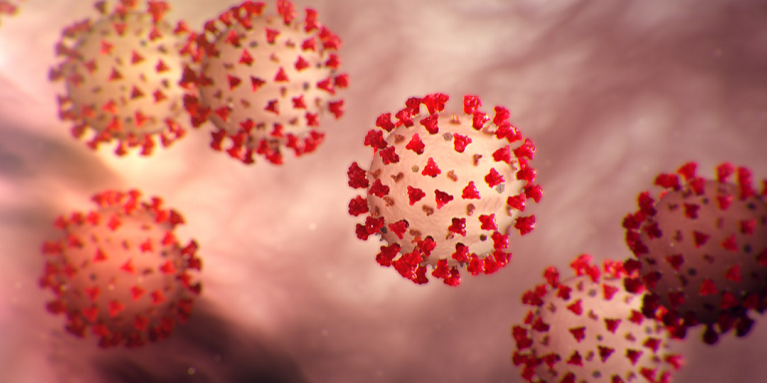
What Are Coronaviruses?
Coronaviruses are a large family of respiratory viruses that includes COVID-19, Middle East Respiratory Syndrome (MERS), and Severe Acute Respiratory Syndrome (SARS). Coronaviruses cause diseases in animals and humans. They often circulate among camels, cats, and bats, and can sometimes evolve and infect people.
In humans, the viruses can cause mild respiratory infections, like the common cold, but can lead to serious illnesses, like pneumonia.
Coronaviruses are named for the crown-like spikes on their surface. Human coronaviruses were first identified in the mid-1960s. Public health officials closely monitor them.
COVID-19
The novel coronavirus (SARS-CoV-2) that causes COVID-19 first emerged in the Chinese city of Wuhan in 2019 and was declared a pandemic by the World Health Organization (WHO). In December 2020, the US launched a national vaccination campaign. There are steps you can take to help stop the spread and protect against severe illness due to COVID-19, including getting vaccinated.
Middle East Respiratory Syndrome (MERS)
Middle East Respiratory Syndrome (MERS) was first reported in 2012 in Saudi Arabia and spread to more than 25 other countries. MERS originated in camels and emerged to infect people. Symptoms usually include fever, cough, and shortness of breath, and often progress to pneumonia. About 3 or 4 out of every 10 patients reported with MERS have died. MERS cases continue to occur, primarily in the Arabian Peninsula; however, there have been only 2 confirmed cases of MERS in the US, both in 2014.
Severe Acute Respiratory Syndrome (SARS)
Severe Acute Respiratory Syndrome (SARS) originated in small mammals and emerged to infect people. SARS was first reported in Southern China in 2002 and the illness spread to more than 2 dozen countries in North America, South America, Europe, and Asia. Symptoms include fever, chills, and body aches, and may progress to pneumonia. Infection with the SARS virus causes acute respiratory distress (severe breathing difficulty), with a mortality rate of about 10%. The illness spread to more than 2 dozen countries in North America, South America, Europe, and Asia before the SARS global outbreak of 2003 was contained.
Symptoms of Coronaviruses
Most people get infected with human strains of coronaviruses at some point in their lives. These illnesses usually last for a short amount of time, and symptoms may include:
- Fever
- Cough
- Headache
- Runny nose
- Sore throat
Additional symptoms have been reported with COVID-19. Human coronaviruses can cause other more serious illnesses, such as pneumonia or bronchitis. This is more common in individuals with heart and lung disease, those with weakened immune systems, infants, and older adults.
If you are concerned about symptoms, call a healthcare professional and tell them about recent travel or exposures. Do not go directly to the doctor’s office or hospital, where you may infect other people.
Diagnosis
There are laboratory tests available to detect human coronaviruses. For COVID-19, viral tests can detect current infection, and antibody tests can detect previous infection.
Prevention
Human coronaviruses can be spread primarily through:
- Coughing and sneezing
- Close personal contact, such as touching or shaking hands
- Touching an object or surface with the virus on it, then touching your mouth, nose, or eyes
There are steps you can take to help prevent infection and protect yourself and others from severe illness:
- Get vaccinated
- Wash your hands with soap and water for at least 20 seconds
- Avoid touching your eyes, nose, or mouth
- Cover coughs and sneezes with a tissue
- Clean and disinfect objects and surfaces
- Avoid close contact with people who are sick and stay home if you are sick
- Wear a face mask
- Take steps for cleaner air, such as opening windows or going outdoors
Treatment
The Food and Drug Administration (FDA) has authorized or approved treatments for certain patients who are more likely to get very sick from COVID-19. If you do test positive, call a healthcare professional immediately to see if treatment is right for you.
For all patients who have COVID-19 or other coronaviruses, supportive care is recommended:
- Take pain and fever medications
- Use a humidifier or take a hot shower
- Drink plenty of liquids
- Stay home and rest
Updated March 2024
Sources: Centers for Disease Control and Prevention, Food and Drug Administration
Related Resources

From Shark Dreams to Global Health with Craig Spencer, MD, MPH
S3, E11: Craig Spencer, MD, MPH, emergency physician and global health expert, talks about what it takes to lead in times of crisis. From treating Ebola patients in Guinea to navigating COVID-19 in New York—and why the lessons of past pandemics must not be forgotten …

Key Takeaways from 2024-2025 Respiratory Season
In this recorded webinar, NFID hosts a discussion on key takeaways from the 2024-2025 US respiratory season, with a focus on influenza (flu) and more …

Improving US Adult Vaccination Rates
In this recorded webinar, NFID and partner AMGA host a discussion on strategies to increase vaccination rates among US adults
Related Posts

Infectious Diseases in the News
Read recent news of interest from the world of infectious diseases including insights and updates on COVID-19, handwashing, hepatitis, malaria, measles, and respiratory syncytial virus (RSV) …

Vaccines and Heart Health: A Vital Connection
Heart disease can increase the risk of serious or fatal complications from respiratory diseases including COVID-19, flu, and RSV

Harnessing the Power of Local Data
NFID dashboard aims to empower stakeholders with hyperlocal data to increase US adult respiratory vaccine uptake
